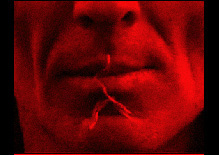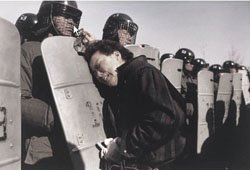Հոդված 6. «ԼԱՎ ՏՂԵ՞ՐՔ, ԹԵ՞ ԼԱՎ ՀԱՍԱՐԱԿՈՒԹՅՈՒՆ»
Հայկական Ժամանակ, 9.05.2008
Այսօր էլ դեռ հաճախ կարելի է ականատես դառնալ կամ ներգրավվել քաղաքական բնույթի կենցաղային խոսակցությունների եւ բանավեճերի մեջ, որոնց հիմնական շեշտադրումը «սրանց» ու «նրանց» համեմատությունն է՝ «սրանք» մի բան չեն, բայց նրանք էլ ավելի լավը չեն, բա ի՞նչ կփոխվի, եթե «սրանց» փոխենք «նրանցով» եւ այլն:
Հետաքրքիր է, որ այս ոճի դատողությունները բնորոշ են ոչ միայն միջին կրթական ցենզ ունեցող հայաստանցիներին, այլեւ իրենց մտավորական համարող շատ ու շատ մարդկանց, այդ թվում` արտասահմաններում ապրած կամ ապրող: Զարմանալի է այստեղ այն, որ, փաստորեն, ստացվում է` արտաքուստ դավանելով ազատական, ժողովրդավարական եւ այլ «պուպուշ» արժեքներ` իրականում մտավորականության այդ մասը միանգամայն այլ մտածողության կրող է: Դժվարանում եմ տալ այդ մտածողության ստույգ անվանումը, բայց երեւի դա կարելի է կոչել հեքիաթային, հրաշք սպասող, մի տեսակ մանկամիտ մտածողություն: Ի դեպ, հեքիաթային մտածելակերպը առհասարակ բավականին լայն տարածում ունի մեզանում, եւ դա է պատճառը պետականության կառուցման գործում մեր բազմաթիվ ձախողումների: Օրինակ, երբ Ռ. Քոչարյանը փետրվարի վերջին փոխանակ հասարակությանը առաջարկեր երկրում տեղի ունեցող զանգվածային բողոքի վերլուծական ու հասարակագիտական բացատրությունը, ինչը վայել կլիներ նախագահին, պնդում էր, թե հանրահավաքի մասնակիցներին հրապարակում պահում են զանազան հնարքների միջոցով, ակնհայտ դարձավ, որ այդ մարդը կրող է ոչ թե իրատեսական, այլ հեքիաթային մտածելակերպի, իսկ նրա «հնարներ»-ը ոչ այլ ինչ են, քան հեքիաթներում հիշատակվող կախարդական «հունարներ»-ը: Պարզ է, որ այսպիսի մակարդակով ժամանակակից եւ մրցունակ պետություն կառուցելը անհնար է: Վերադառնանք, սակայն, «սրանց» ու «նրանց» թեմային: Այստեղ եւս ակնհայտ է հեքիաթային ոչ իրատեսական մտածելակերպը, քանի որ բանավեճը «սրանց» ու «նրանց» անձնական հատկանիշների համեմատության մակարդակ տեղափոխողները, փաստորեն, ենթադրում են, որ Հայաստանում իրական փոփոխություններ կարող են լինել միայն այն ժամանակ, երբ իշխանության գա մի ինչ-որ «լավ տղերքի» խումբ, որը կտարբերվի «սրանցից» ու «նրանցից»: Այսինքն` այս մարդիկ եւս սպասում են հրաշքի, մանավանդ որ սեփական մասնակցությունը փոփոխությունների գործընթացում նրանք չեն տեսնում: Ինչ-որ տեղից, անհայտ պայմաններում պետք է ձեւավորվեն այդ լավ տղերքը, որոնք կլինեն լավ, մաքուր, ազնիվ, անկաշառ ու մի օր էլ նույնպես անհայտ մեխանիզմներով կգան իշխանության: Իհարկե, երբ այդպես բացահայտ այս մտածողության կետերը շարադրում ես, ակնհայտ է դառնում դրա անհեթեթ բնույթը: Բայց եթե ուշադիր լինենք, հենց այդպես էլ մտածում է մեր երկրի բնակիչների մի զգալի մասը, կամ հենց սա է հետեւում որպես «սրանց» ու «նրանց» մասին վեճի տրամաբանության արդյունք: Իրոք, եթե խնդիրը միայն «սրանց» ու «նրանց» անձնական հատկանիշների, վատը կամ լավը լինելու մեջ է, հետեւաբար ելքը այն է, որ պետք է գտնել «սրանցից» ու «նրանցից» դուրս գտնվող մի այլ՝ «լավ տղերքի» խումբ, որը եւ պետք է լուծի եղած բոլոր հարցերը: Նորից եմ ուզում շեշտեմ` ինչքան էլ թղթի վրա շարադրած այս մտածողությունը անհեթեթ չթվա, պետք է խոստովանենք, որ շատերս, թեկուզ ենթագիտակցորեն, «լավ տղերքի» հայտնության սպասումի մեջ ենք: Բայց եթե ցանկանում ենք դուրս գալ հեքիաթների աշխարհից դեպի պետականության կառուցում, պետք է գիտակցենք, որ լավ տղերքը երբեք չեն գա: Այդքան շատ լավ տղա ուղղակի չկա, որպեսզի կարողանաս կառավարական ապարատի բոլոր օղակները դրանցով լցնես: Լավ տղան էլ պայմանական հասկացողություն է. բոլորս էլ մարդ ենք եւ ունենք ամենքս մեր թույլ կողմը: Ոչ մի երաշխիք չկա, որ գալով իշխանության եւ ստանալով այն հնարավորությունները, որոնք այսօր առկա են Հայաստանում իշխանության մոտ գտնվող մարդու համար, ասենք` հենց տողերիս հեղինակը «լավ տղուց» դառնա շատ «վատ տղա»:
Բայց ի՞նչ անել այդ դեպքում: Մարդկությունը հնից ի վեր մի շատ պարզ մեխանիզմ է ստեղծել, եւ այս առումով հեծանիվ հորինել պետք չէ: Դա իշխանության սահմանափակման մեխանիզմն է: Բայց միայն թղթի վրա սահմանել այդ մեխանիզմի կանոնները բավական չէ, քանի որ ցանկացած իշխանություն, այդ թվում` «լավ տղերքից» ձեւավորված իշխանությունը, բնազդաբար ձգտում է անսահմանափակության եւ տարածվում է այնքան, մինչեւ չի հանդիպում լուրջ արգելքների: Հետեւաբար իշխանության սահմանափակումը հնարավոր է միայն ակտիվ հասարակության պայմաններում: Իհարկե, այս ամենը հայտնություն չէ, եւ կարող է թվալ, որ անտեղի հիշեցնում ենք հանրահայտ ճշմարտություններ: Բայց իրականում հիշեցումն անտեղի չէ, որովհետեւ դա հնարավորություն է տալիս ճիշտ եւ աներկբա կողմնորոշվելու այսօրվա իրավիճակում եւ դուրս գալ «սրանց» ու «նրանց», «նախկինների» ու «ներկաների» մասին տաղտկալի վեճերի անվերջ եւ անպտուղ ցիկլից: Պետք է ընտրել ոչ թե «սրանց» ու «նրանց» միջեւ, ոչ թե «վատի» ու «վատթարագույնի» միջեւ, ինչպես ներկայացնում են շատերը, այլ առհասարակ այդ համատեքստից դուրս՝ ընտրել հասարակության ակտիվացման եւ իշխանության սահմանափակման գործընթացի կողմը: Եւ այս առումով այսօր Հայաստանում մի հրաշալի իրավիճակ է: Անուրանալի է նոր Շարժման դերը այս իրավիճակի ստեղծման մեջ, եւ այս առումով վեճերը նախկինի մասին ուղղակի անիմաստ են դառնում: Մեր աչքի առաջ ձեւավորվում է ակտիվ հասարակություն: Բավական է միայն վերհիշել վերջին շրջանի դատավարությունները եւ ժողովրդի մասնակցությունը դրանցում, «ԳԱԼԱ» հեռուստաընկերության հանգանակությունը, տեղական ցույցերը, բազմաթիվ մեծ եւ փոքր ակցիաները, նոր կազմակերպությունների եւ նախաձեռնությունների առաջանալը, երիտասարդության ակտիվացումը, նոր սերնդի հասարակական գործիչների հանդես գալը եւ այլն: Սա մի վիճակ է, որի մասին կարելի էր միայն երազել դեռ մեկ տարի առաջ: Այս առումով Շարժումը շատ ավելի կարեւոր նպատակի է հասել, քան նույնիսկ իշխանության գալը, որովհետեւ դեռ հարցական է, թե իշխանության գալով` կկարողանա՞ր այս նույն գործընթացները նույն հաջողությամբ առաջ տանել: Հասարակական ակտիվացման, ինքնակազմակերպման գործընթացը պետք է շարունակի մնալ Շարժման գործընթացի կիզակետում, եւ եթե գործընթացը շարունակվի ու ծավալվի, ապա վերջնականապես անհնար կդառնա Հայաստանում հին ձեւով կառավարել: Արդեն այսօր դա, մեծ հաշվով, հնարավոր չէ: Եւ այս առումով նույնիսկ երկրորդական կարող է դառնալ այն հարցը, թե ո՞վ է գտնվելու իշխանության մոտ: Ցանկացած ապագա կառավարություն, գալով իշխանության, պետք է ունենա այնպիսի հասարակություն, որը թույլ չտա կառավարությանը ղեկավարել երկիրը այն փնթի գեղական ձեւերով, որով կառավարում էր Ռ. Քոչարյանը, եւ որով շարունակում է կառավարել այսօրվա ինքնահռչակ իշխանությունը: Իհարկե, երբ ասում եմ, թե կառավարության հարցը կարող է երկրորդական դառնալ, ի նկատի չունեմ այսօրվա կառավարությունը, քանի որ ինչքան էլ այսօր դրա ներկայացուցիչները եւ կողմնակիցները չփորձեն պուպուշ բալեք ձեւանալ, նրանցից յուրաքանչյուրը պետք է հիշի, որ նա այսօր իշխանության մոտ է, որովհետեւ մարտի 1-ի երեկոյան սպանվել են ՀՀ քաղաքացիները: Բայց ցանկացած այլ նոր կառավարություն, ով էլ լինի դրա կազմում, չի կարողանալու երկիրը ղեկավարել հին ձեւով: Այսինքն` Հայաստանի իրավիճակն այսօր հետեւյալն է. ընդդիմադիր շարժումը չունեցավ բավականաչափ ռեսուրս, որպեսզի լուծի իշխանափոխության հարցը, բայց մյուս կողմից` նա կարողացավ մոբիլիզացնել բավականաչափ ռեսուրս, որպեսզի անհնարին դարձնի վերադարձը դեպի 2007 թվականի ամռան վիճակ եւ ընդդիմադիր շարժման ճնշում: Այս առումով, ի դեպ, խորհուրդ կտայի առանձնապես չնյարդայնանալ Շարժման ընդդիմախոսների նկատմամբ, քանի որ այդ մարդիկ պարզապես անցյալ ժամանակում են մնացել եւ չեն զգացել որակապես նոր ժամանակների առաջ գալը: Այդպես միշտ է լինում պատմական շրջադարձային պահերին: Հասարակության մի մասը չի հասցնում, այսպես ասած, փոխել իր ներքին ժամացույցը: Կանցնի մեկ-երկու տարի, եւ նրանցից շատերը աննկատորեն կանցնեն նույն «լեզվի», որով այսօր մենք ենք խոսում, ինչպես որ 80-ականների Շարժման բազմաթիվ հակառակորդներ այսօր օգտագործում են նույն արժեքային լեզուն, որը ձեւավորվեց այդ շարժման ընթացքում: Մենք ապրում ենք մի գեղեցիկ ժամանակահատված, երբ վերականգնվում է մեր հասարակության սերը, հարգանքը, հպարտությունը իր իսկ նկատմամբ: Արդեն ակնհայտ է, որ Շարժումը հնարավոր չեղավ ճնշել: Իսկ դա ավելի քան լուրջ խնդիր է այսօրվա կառավարության համար: Սա նշանակում է, որ ուշ թե շուտ իշխանափոխության հարցն էլ լուծվելու է: Բայց այդ ժամանակ մենք արդեն կունենանք նոր հասարակություն, որին ցանկության դեպքում էլ շատ դժվար կլինի կառավարել այնպես, ինչպես դա արվում է այսօր, եւ ուրեմն Շարժումն իր նպատակները լուծած կլինի լիովին: Միայն թե ոչ մի դեպքում ոչ մի ներում չպետք է լինի ոչ միայն մարտի 1-ի գլխավոր դերակատարների, այլեւ այսօր նրանց ստվերում թաքնված մանկլավիկների համար: Ամեն մի Շարմազանով եւ Իսագուլյան, որոնք այսօր փորձում են երկխոսության մասին խոսել, պետք է գիտակցեն, որ ոչ միայն իրենց գերադասները, այլեւ անձամբ նրանք ունեն այն, ինչ այսօր ունեն շնորհիվ մարդկային զոհերի, ու որ առնվազն բարոյական պատասխանատվություն են կրում դրա համար:
ՀՐԱՆՏ ՏԷՐ-ԱԲՐԱՀԱՄԵԱՆ












